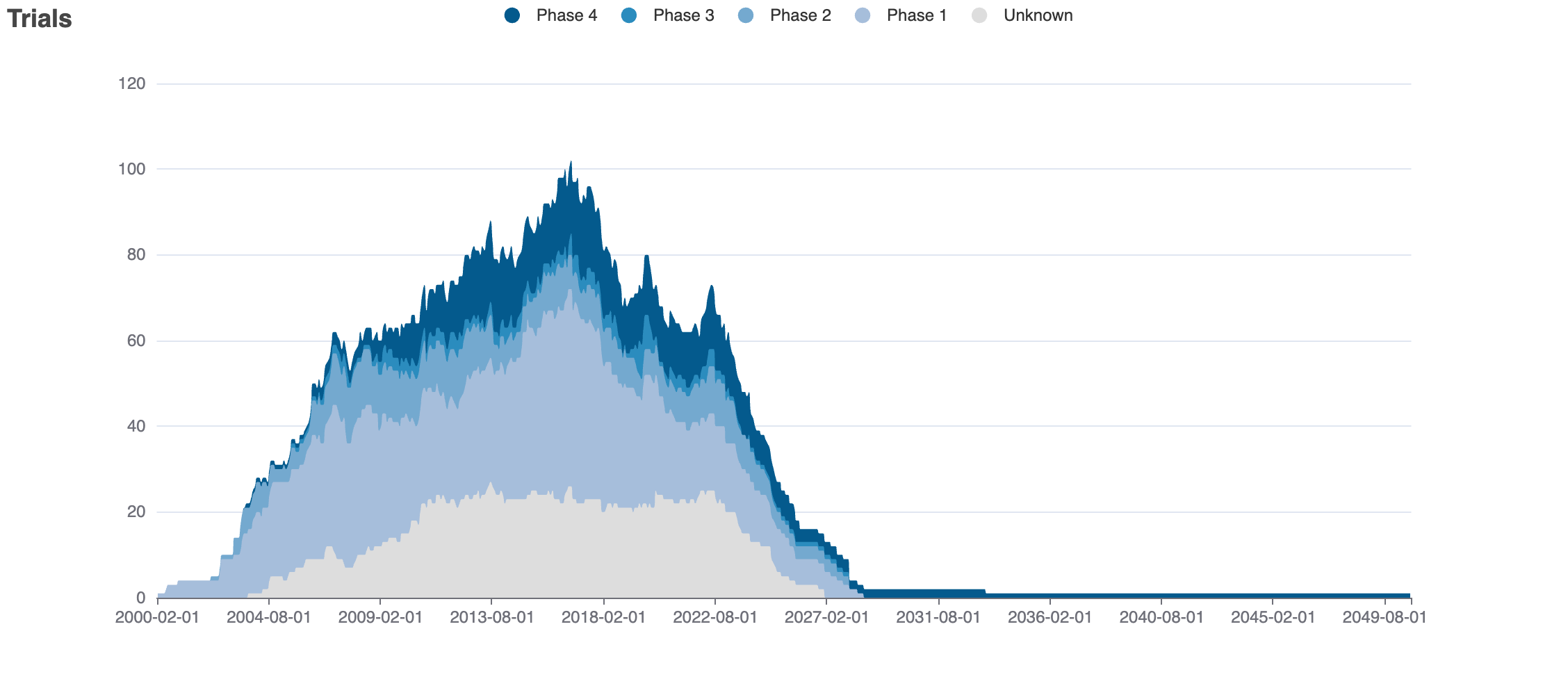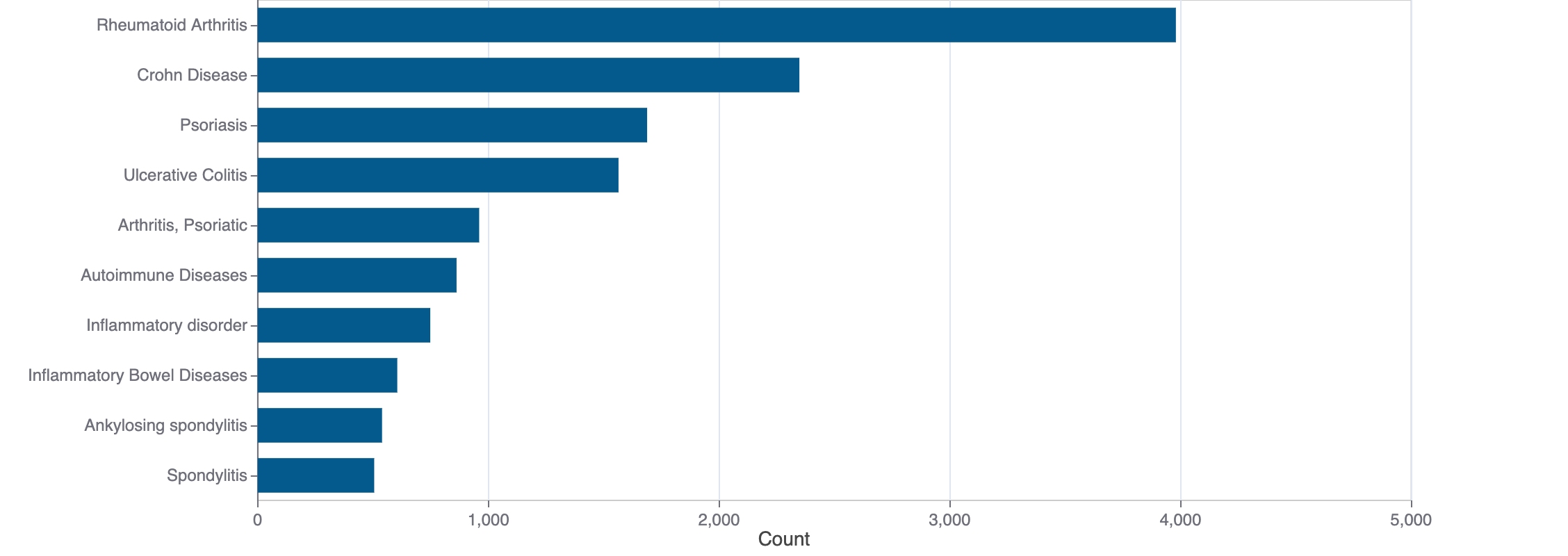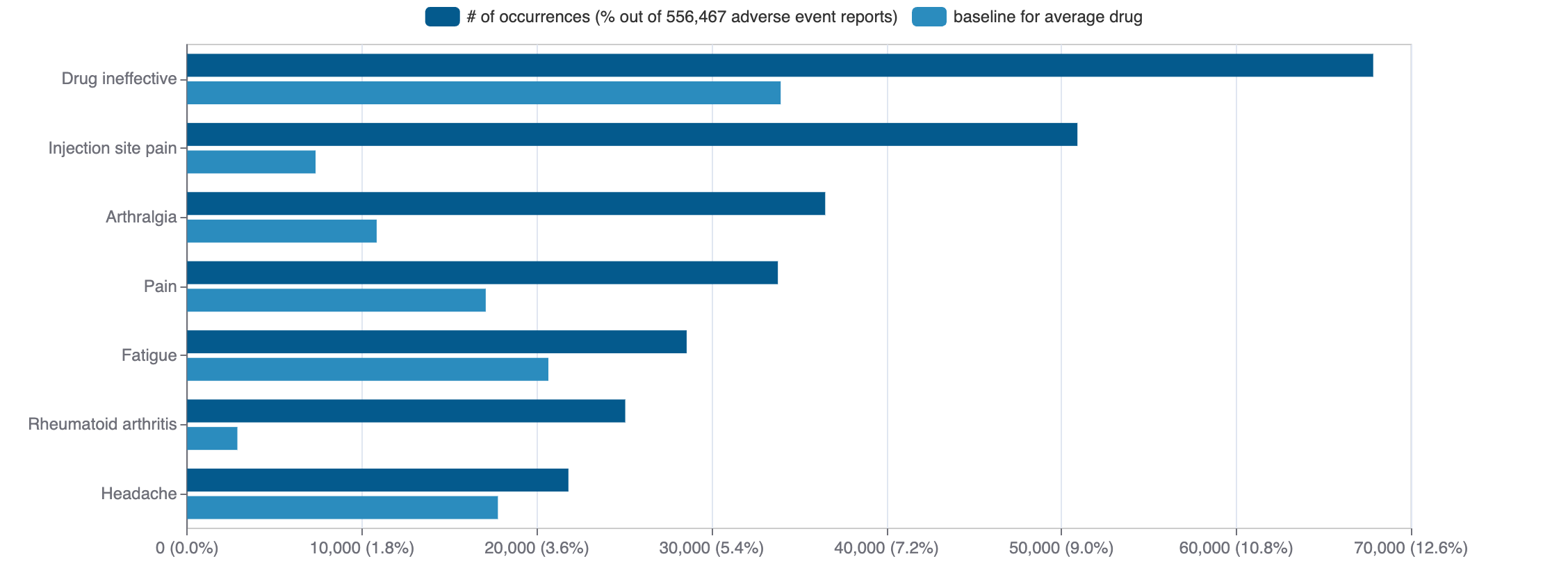Propantheline
Pro-banthine (propantheline) is a small molecule pharmaceutical. Propantheline was first approved as Pro-banthine on 1982-01-01. It is used to treat irritable bowel syndrome, pancreatitis, peptic ulcer, spasm, and urethral diseases amongst others in the USA. The pharmaceutical is active against muscarinic acetylcholine receptor M1, muscarinic acetylcholine receptor M3, and muscarinic acetylcholine receptor M2. In addition, it is known to target muscarinic acetylcholine receptor M4.
Download report
Favorite
Commercial
Therapeutic Areas
Therapeutic Area | MeSH |
|---|---|
| digestive system diseases | D004066 |
| nervous system diseases | D009422 |
| urogenital diseases | D000091642 |
| signs and symptoms pathological conditions | D013568 |
Trade Name
FDA
EMA
No data
Drug Products
FDA
EMA
New Drug Application (NDA)
New Drug Application (NDA)
Abbreviated New Drug Application (ANDA)
Abbreviated New Drug Application (ANDA)
Labels
FDA
EMA
No data
Indications
FDA
EMA
Indication | Ontology | MeSH | ICD-10 |
|---|---|---|---|
| irritable bowel syndrome | EFO_0000555 | D043183 | K58 |
| pancreatitis | EFO_0000278 | D010195 | K85 |
| peptic ulcer | HP_0004398 | D010437 | K27 |
| spasm | — | D013035 | M62.83 |
| urethral diseases | — | D014522 | N36.9 |
| urinary bladder diseases | — | D001745 | N32.9 |
Agency Specific
FDA
EMA
No data
Patent Expiration
No data
ATC Codes
A: Alimentary tract and metabolism drugs
— A03: Drugs for functional gastrointestinal disorders
— A03A: Drugs for functional gastrointestinal disorders
— A03AB: Synthetic anticholinergics, quaternary ammonium compounds for functional gastrointestinal disorders
— A03AB05: Propantheline
— A03C: Antispasmodics in combination with psycholeptics
— A03CA: Synthetic anticholinergic agents in combination with psycholeptics
— A03CA34: Propantheline and psycholeptics
HCPCS
No data
Clinical
Clinical Trials
202 clinical trials
View more details

Mock data
Subscribe for the real data
Subscribe for the real data
Indications Phases 4
Indication | MeSH | Ontology | ICD-10 | Ph 1 | Ph 2 | Ph 3 | Ph 4 | Other | Total |
|---|---|---|---|---|---|---|---|---|---|
| Nausea | D009325 | HP_0002018 | R11.0 | — | 2 | 2 | 4 | 3 | 11 |
| Migraine disorders | D008881 | EFO_0003821 | G43 | — | 1 | 1 | 4 | 3 | 9 |
| Vomiting | D014839 | HP_0002013 | R11.1 | — | 2 | 2 | 1 | 2 | 7 |
| Headache | D006261 | HP_0002315 | R51 | — | — | 1 | 2 | 1 | 4 |
| Pruritus | D011537 | HP_0000989 | L29 | — | 1 | — | 1 | 2 | 4 |
| Postoperative nausea and vomiting | D020250 | EFO_0004888 | — | — | — | 2 | 1 | 3 | |
| Prostatic neoplasms | D011471 | C61 | — | 1 | — | 1 | — | 2 | |
| Chronic hepatitis b | D019694 | EFO_0004197 | B18.1 | — | 1 | — | 1 | — | 2 |
| Sleep | D012890 | GO_0030431 | 1 | — | — | 1 | — | 2 | |
| Aggression | D000374 | EFO_0003015 | — | — | 1 | 1 | — | 2 |
Show 12 more
Indications Phases 3
Indication | MeSH | Ontology | ICD-10 | Ph 1 | Ph 2 | Ph 3 | Ph 4 | Other | Total |
|---|---|---|---|---|---|---|---|---|---|
| Healthy volunteers/patients | — | 9 | — | 1 | — | 1 | 11 | ||
| Pain | D010146 | EFO_0003843 | R52 | 2 | 1 | 2 | — | 3 | 8 |
| Depression | D003863 | F33.9 | — | 1 | 1 | — | 3 | 5 | |
| Breast neoplasms | D001943 | EFO_0003869 | C50 | — | 2 | 2 | — | 1 | 4 |
| Lupus nephritis | D008181 | EFO_0005761 | — | 2 | 2 | — | — | 4 | |
| Systemic lupus erythematosus | D008180 | EFO_0002690 | M32 | — | 2 | 3 | — | — | 4 |
| Sleep initiation and maintenance disorders | D007319 | F51.01 | 1 | — | 1 | — | 1 | 3 | |
| Vertigo | D014717 | H81.39 | — | — | 2 | — | 1 | 3 | |
| Chronic urticaria | D000080223 | L50.8 | — | 1 | 1 | — | — | 2 | |
| Lung neoplasms | D008175 | C34.90 | 1 | 1 | 1 | — | — | 2 |
Show 26 more
Indications Phases 2
Indication | MeSH | Ontology | ICD-10 | Ph 1 | Ph 2 | Ph 3 | Ph 4 | Other | Total |
|---|---|---|---|---|---|---|---|---|---|
| Multiple myeloma | D009101 | C90.0 | 2 | 4 | — | — | — | 6 | |
| Precursor cell lymphoblastic leukemia-lymphoma | D054198 | C91.0 | 3 | 2 | — | — | — | 4 | |
| Neoplasms | D009369 | C80 | 1 | 3 | — | — | — | 4 | |
| Non-hodgkin lymphoma | D008228 | C85.9 | 2 | 3 | — | — | — | 4 | |
| Atopic dermatitis | D003876 | EFO_0000274 | L20 | 1 | 1 | — | — | 1 | 3 |
| Myeloid leukemia acute | D015470 | C92.0 | 2 | 1 | — | — | — | 2 | |
| Bcr-abl positive chronic myelogenous leukemia | D015464 | EFO_0000340 | 2 | 1 | — | — | — | 2 | |
| Kidney transplantation | D016030 | 1 | 2 | — | — | — | 2 | ||
| Lymphoma | D008223 | C85.9 | — | 2 | — | — | — | 2 | |
| Large b-cell lymphoma diffuse | D016403 | C83.3 | — | 2 | — | — | — | 2 |
Show 40 more
Indications Phases 1
Indication | MeSH | Ontology | ICD-10 | Ph 1 | Ph 2 | Ph 3 | Ph 4 | Other | Total |
|---|---|---|---|---|---|---|---|---|---|
| Pure autonomic failure | D054970 | 1 | — | — | — | — | 1 | ||
| Orthostatic hypotension | D007024 | I95.1 | 1 | — | — | — | — | 1 | |
| Graft vs host disease | D006086 | D89.81 | 1 | — | — | — | — | 1 | |
| Sickle cell anemia | D000755 | EFO_0000697 | D57 | 1 | — | — | — | — | 1 |
| Hematologic neoplasms | D019337 | 1 | — | — | — | — | 1 | ||
| Hodgkin disease | D006689 | C81 | 1 | — | — | — | — | 1 | |
| Systemic mastocytosis | D034721 | C96.21 | 1 | — | — | — | — | 1 | |
| Hairy cell leukemia | D007943 | C91.4 | 1 | — | — | — | — | 1 | |
| Autonomic nervous system diseases | D001342 | EFO_0009532 | G90 | 1 | — | — | — | — | 1 |
| Fibrosis | D005355 | 1 | — | — | — | — | 1 |
Show 14 more
Indications Without Phase
Indication | MeSH | Ontology | ICD-10 | Ph 1 | Ph 2 | Ph 3 | Ph 4 | Other | Total |
|---|---|---|---|---|---|---|---|---|---|
| Long-term memory | D057567 | — | — | — | — | 1 | 1 | ||
| Short-term memory | D008570 | EFO_0004335 | — | — | — | — | 1 | 1 | |
| Polycystic ovary syndrome | D011085 | EFO_0000660 | E28.2 | — | — | — | — | 1 | 1 |
| Hiv infections | D015658 | EFO_0000764 | B20 | — | — | — | — | 1 | 1 |
| Wounds and injuries | D014947 | T14.8 | — | — | — | — | 1 | 1 | |
| Substance-related disorders | D019966 | EFO_0003890 | F13 | — | — | — | — | 1 | 1 |
| Chronic disease | D002908 | — | — | — | — | 1 | 1 | ||
| Brain injuries | D001930 | S06.9 | — | — | — | — | 1 | 1 | |
| Alcohol-related disorders | D019973 | F10 | — | — | — | — | 1 | 1 | |
| Cognitive dysfunction | D060825 | G31.84 | — | — | — | — | 1 | 1 |
Show 18 more
Epidemiology
Epidemiological information for investigational and approved indications
View more details
Drug
General
| Drug common name | PROPANTHELINE |
| INN | propantheline bromide |
| Description | Propantheline bromide (INN) is an antimuscarinic agent used for the treatment of excessive sweating (hyperhidrosis), cramps or spasms of the stomach, intestines (gut) or bladder, and involuntary urination (enuresis). It can also be used to control the symptoms of irritable bowel syndrome and similar conditions. This agent can also be used for patients who experience intense GI symptoms while tapering off of TCAs.
|
| Classification | Small molecule |
| Drug class | — |
| Image (chem structure or protein) | |
| Structure (InChI/SMILES or Protein Sequence) | CC(C)[N+](C)(CCOC(=O)C1c2ccccc2Oc2ccccc21)C(C)C |
Identifiers
| PDB | — |
| CAS-ID | 50-34-0 |
| RxCUI | 8762 |
| ChEMBL ID | CHEMBL1180725 |
| ChEBI ID | 8481 |
| PubChem CID | 9279 |
| DrugBank | DBSALT000225 |
| UNII ID | UX9Z118X9F (ChemIDplus, GSRS) |
Target
Variants
Clinical Variant
No data
Financial
No data
Trends
PubMed Central
Top Terms for Disease or Syndrome:

Mock data
Subscribe for the real data
Subscribe for the real data
Additional graphs summarizing 1,117 documents
View more details
Safety
Black-box Warning
No Black-box warning
Adverse Events
Top Adverse Reactions

Mock data
Subscribe for the real data
Subscribe for the real data
10,948 adverse events reported
View more details
Premium feature
Learn more about premium features at pharmakb.com
Learn more
